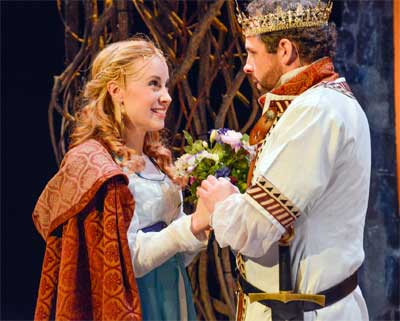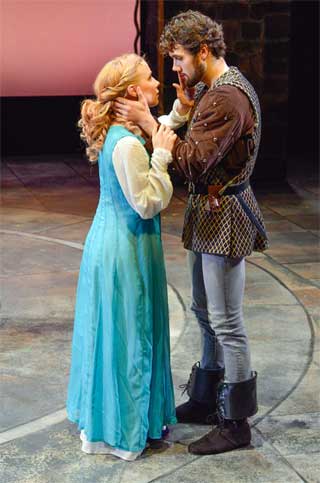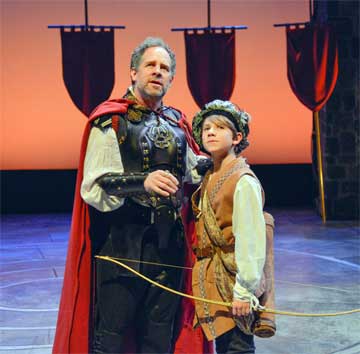Musical (1960)
Book and lyrics by Alan Jay Lerner
Music by Frederick Loewe
Directed and choreographed by Russell Garrett
Musical direction by David McGrory
New Repertory Theatre
Arsenal Center for the Arts
Watertown, MA
November 23 – December 22, 2013
With Benjamin Evett (Arthur), Erica Spyres (Guenevere), Marc Koeck (Lancelot), Robert D. Murphy (Merlyn, Pellinore), Nick Sulfaro (Mordred), Maurice Emmanuel Parent (Sir Lionel), Dashiell Evett (Tom of Warwick), Rachel Abbate (Lady in Waiting), Troy Barboza (Guilliam), Rishi Basu (Castor), Mirchael J. Borges (Sir Dinadan), Kevin Cirone (Sir Sagramore), Shonna Cirone (Lady Anne), Katie Clark (Morgan Le Fey), Natalie Hall (Young Girl in Waiting), Mark Linehan (Colgrevance), Brittney Morello (Nimue), Julian Schepis (Page), Jacob Sherburne (Bliant), Jackie Theoharis (Lady in Waiting), Jeremy A. Towle (Squire Dap)

Benjamin Evett as Arthur
in “Camelot”
Photo: Andrew Brilliant/Brilliant Pictures
Courtesy of New Repertory Theatre
King Arthur and Guenevere meet, marry and establish operations in Camelot. A dashing young French knight, Lancelot, comes along, enters the mix and, though noble, complicates things, adding a romantic triangle to the Round Table.
In days of yore, I listened to the original Broadway cast recording of this show many times. It included Richard Burton as Arthur, Julie Andrews as Guenevere and Robert Goulet as Lancelot and became to me pretty much the singular and iconic version of the show.
I never saw it onstage, however, and having the opportunity to see it in this delightfully conceived and executed New Rep production is a pleasure and something of a revelation. Until attending this production, I had no real idea of the extent of the humor and satire in the show, and it turns out there is plenty of it. Though one would not have to go too far to infer that Lancelot’s vain ballad C’est Moi was a big joke, but, hearing it on disk rather than seeing it on stage did not quite deliver that message so clearly. And, from the staged version, one gets the ironic drift in plenty of other instances.
The inspiration for this production is, in large part, the fiftieth anniversary of President Kennedy’s assassination and the era in Washington during by his leadership commonly identified as Camelot.
Benjamin Evett (Arthur), a long-time member of the resident company at the American Repertory Theater, then founding artistic director of the Actors’ Shakespeare Project, is wonderful in this role. Who knew he could sing? And he sings beautifully, with a kind of tuneful declamation, recalling something of Richard Burton’s robust, though not highly lyrical, voice, appropriate for the role. As well, Evett delivers a humane, vulnerable and subtle dramatic interpretation of Arthur, believably bearing his insecurities and frailties within his kingly demeanor.
He is complemented beautifully by Erica Spyres (Guenevere) who I have heard sing numerous times and whose voice is clear, bright and lyrically supple. I think, even since the last times I heard her, her voice has filled out even more and become deeper and fuller. She has always sung with precision and grace, and now the tonality is even more satisfying. She is also a superb actress and conveys, both through voice and gesture, a fabulous sassiness to the role. I only heard Julie Andrews in the role, never saw her, but get out of Spyres’ embodiment of Guinevere a character of greater nuance and complexity.
Both Evett and Spyres work expertly together to produce just the right tone of devotion, playfulness and confusion that their roles demand. They make a great pair; the adjustment of their ironies and profundities is subtle so that the penetrating and comedic dimensions arise in perfect sync. And, as well as singing some great tunes together (What Do The Simple Folk Do?), they have a great dancing duo.

Mark Koeck as Lancelot
in “Camelot”
Photo: Andrew Brilliant/Brilliant Pictures
Courtesy of New Repertory Theatre
Mark Koeck (Lancelot) sings with sweetness and warmth and provides a lighter, less caloric, rendition than the cholesterol-rich Goulet baritone which could lather it on in numbers like If Ever I Would Leave You. He also ably rises to the occasion of transforming a kind of buffoonish prima donna into a genuine romantic hero. It is also nice to get a Lancelot with a French accent – it adds to the almost-white knight’s irresistible charm – which Koeck pulls off rather well.
Robert D. Murphy (Merlyn, Pellinore) is a great elder sidekick to Arthur, and, with bushy beard and wild hair, holds down the consigliere corner with humor and grace.
The knights, especially when they go rogue under Mordor’s (Nick Sulfaro) influence, have a great, robust choral number, full of sharp, energetic singing and choreography. Sulfaro, who played a memorable Angel in the New Repertory Theatre production of Rent in 2011 (directed, by the way, by Benjamin Evett, the Arthur in this Camelot), makes a fine, slithering villain here.
The sets are fairly simple, but, even with just a draping of multiple tapestry rugs, quite effective.

Dashiell Evett as Tom of Warwick
in “Camelot”
Photo: Andrew Brilliant/Brilliant Pictures
Courtesy of New Repertory Theatre
At times, the music, in its pared down small-band version for this production, seems a bit thinly orchestrated. Though the composition itself is quite straightforward, the score has a lot of slippery and transparent passages which are more vulnerable when played by a smaller group. I intuitively expected something like the original cast recording with a big orchestra; instead, here, the combo, though reasonably adept, seemed to be searching for a richness and cohesion that it only episodically achieved.
– BADMan
Leave a Reply